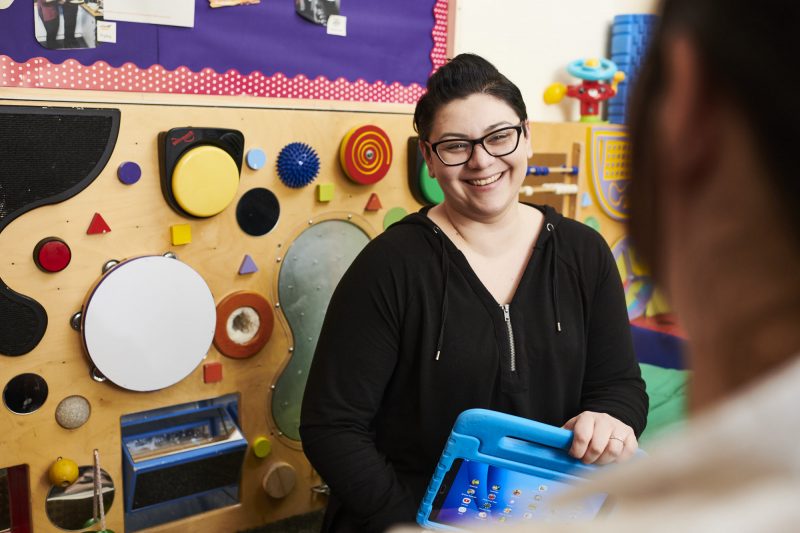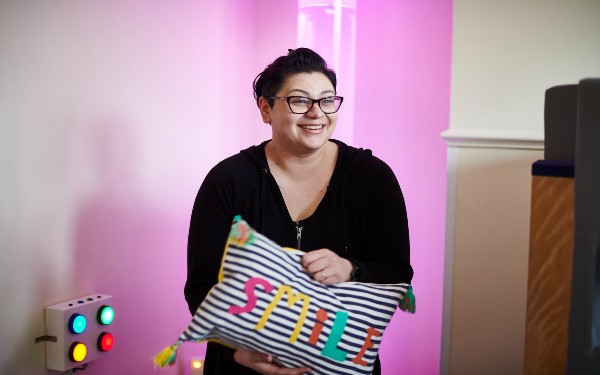After qualifying as a social worker in 2011, Katie Sansom assumed her next step would be as a children’s social worker. However, a placement at a child in care team caused her to realise she had fallen in love with residential care work and changed the course of her career.
Katie has successfully worked her way through career progression opportunities and now manages Lincolnshire County Council (LCC)’s Eastgate residential home in Sleaford, which is rated outstanding by Ofsted.
“I had worked in residential as a relief staff member prior to doing my social work degree,” says Katie.
“While on my final placement in a fieldwork team, I realised that compared to the time I had spent working directly in residential, I spent less time working directly with the children. At the council’s Eastgate children’s home, I had been doing that direct work with children all the time and really enjoyed it. So, when I qualified, I applied for a job in Eastgate, and have been here ever since!”
This is why Katie believes working in residential would be good for anyone starting their career in the social care sector, whether they are social work qualified or not.
“It gives you a better understanding of both sides [social worker and residential] and is a good grounding to work with children,” she says.

Learning curve
Jo Casey is the head of service within the fieldwork side of children’s social work and has the lead for social work recruitment. She sees first-hand the benefit that working in residential settings brings to those who then decide to go on and train as social workers and move into the authority’s frontline social work teams. This includes a greater understanding of children’s needs and of the impact of trauma on children, and having the skills to build lasting, effective relationships with children and young people who often struggle to trust and open up to professionals.
Jo says: “For qualified social workers working within our residential homes, career progression does not mean moving out of the residential sector and leaving what is an exceptionally rewarding career.”
Home managers, like Katie, are often people with social work qualifications or who have gained a specific registered manager qualification. In the space of a decade, Katie has progressed through levels 1,2 and 3 as a residential care officer to assistant manager and is now a home manager.
Training and development
The training available in Lincolnshire means that there are multiple learning opportunities for all staff, like former teacher Shaun, who is undertaking a training programme in the assistant manager role at Northolme, another of the authority’s children’s homes. Gemma was a graduate in criminology and started out as a relief worker before working her way up to her current home manager role.
Management training includes QCF level 5 [a competence-based qualification which is nationally recognised by care providers] and specialist training tailored to children’s needs. Because of the amount of training and development available, staff are very skilled in areas such as social pedagogy, restorative practice, and trauma-informed practice, and will complete direct work with the children and young people in their care to support them to transfer to foster care, semi-independent placements or to their own families.

There is also training available in therapeutic parenting, theory-based approaches to practice, and forest school leadership, which provides training for the outdoors, and the opportunity to become a practice educator for social worker students. Having social work qualified practice educators within the homes means that children’s services can offer social work students the unique opportunity of a placement within the service.
Highly skilled role
Maria, who oversees the management of all the homes in her role as senior lead – residential estates, says: “We need to recognise residential workers as professional in their own right – they are not doing a little bit of babysitting. It is a highly skilled role, with clear career progression and responsibility that enables staff to build one-on-one relationships with the children and young people.”
Gemma, who is home manager at Northolme in Gainsborough, agrees.
“For some of our children, the relationships they form with the staff are the only safe and secure ones they develop. As a result, we play a significant role in these children’s lives. Some of them have come back when they are older with their own children to visit us and some have joined us as staff members.”
Day-to-day role
On a day-to-day level, staff support young people in every aspect of their daily care. The shifts are 10am-11pm and then 7pm-10.30am the next day, with a sleep-in shift between the hours of 10pm-7am. Staff cover around six sleep-ins a month. There is also a late shift from 10am-10pm.

The role includes helping young people prepare for and get to school, supporting them with their homework, helping them at mealtimes and tucking them into bed. Then there are day trips with the children, supporting their hobbies and taking them on what, for some children, are their first holidays! Staff work on a multi-agency level to support children including working closely with the children’s schools, police, health, social workers, occupational therapists and CAMHS.
Positive difference
Katie recalls how her team was able to help a young boy, who had not attended school for two years, re-enter the school system.
“He struggled with emotions and did not want to be in a family environment. But with the help of a tutor and therapy, and by working closely with his new school, we got him to attend. He’s never looked back and really enjoys school. After school, he tells us about his day and it’s moments like that that make me think that my job is amazing, because we can take these small steps with the children to make a positive difference.”

The future
Children are coming into residential a lot earlier, Katie says, prompting the council to open a new residential home for children aged 6-12 years later this year. The development of a six-bed unit for children aged 12-18 year olds due to open in 2023 is also underway. LCC also has three homes specifically for children who have disabilities that offer short breaks as well as long-term care, providing diverse opportunities for those working in children’s residential care in Lincolnshire. The shifts for the children with disabilities homes are from 7am-3pm, 2pm-10pm and 9.30pm-7.30am, the latter being a wakeful night shift.
“The homes are a way of taking that pressure away from families,” Katie says. “And for some children who have complex needs and would, as a result, experience numerous foster placement breakdowns, coming to us at an earlier stage is a really positive thing. It means we can work with the children to support their emotional and social development and give them a positive group living experience, allowing them to develop strong and trusting relationships, build their life and social skills and enable them to have positive outcomes.”
BENEFITS
- Level 1 – £21-269-£23,953
- Level 2 – £26,446-£29,174
- Level 3 – £32,798-£36,371
- Assistant manager – £36,371-£40,578
- Manager – £45,648- £52,725
- Alongside this wage there is the opportunity of up to an extra £5,000-£10,000 with sleep-in allowance, mileage and overtime.
Interested in working at Lincolnshire County Council? Find out more by checking out the latest vacancies here.




 Facebook
Facebook X
X LinkedIn
LinkedIn Instagram
Instagram